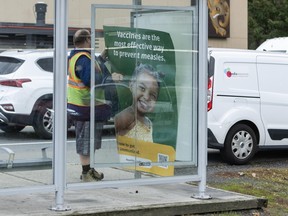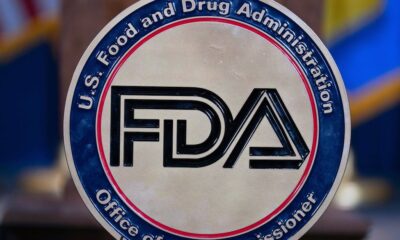Health
B.C. Childhood Vaccination Rates Decline Post-COVID Pandemic

Childhood vaccination rates in British Columbia (B.C.) have not rebounded from a decline that began during the COVID-19 pandemic, according to recent data from the B.C. Centre for Disease Control (BCCDC). Despite encouraging messages for seasonal flu and COVID-19 vaccinations, rates for routine childhood immunizations have fallen significantly, particularly among second-graders.
Data presented by Dr. Jia Hu, the interim medical director of immunization programs at the BCCDC, indicates a “small-to-medium decline” in vaccination rates since 2021. The most serious drop is seen in seven-year-olds, where over one-third of second-graders are not up-to-date on essential vaccines like those for mumps and measles. Overall, the vaccination rate has decreased nearly 10 percent from 2021 to 2024, from 72.5 percent to 63.8 percent.
Dr. Hu noted that while the pandemic made some vaccines less accessible, it is not the sole cause of the ongoing slump. He pointed out that the number of children with “documented refusals” — those whose parents have explicitly declined vaccinations — has remained stable. This suggests that the actual immunization rate may be higher than reported, as many records from children vaccinated in other provinces or countries may be missing.
In the context of high migration, gaps in immunization coverage are not unusual, as parents might have been unable to update their children’s health records promptly. Nonetheless, Dr. Hu emphasized that provincial data is valuable for identifying broader trends.
Examining the immunization rates for two-year-olds reveals that the decline among older children is not isolated to those who missed appointments during the pandemic. The rates for toddlers born after the pandemic peak are also lower than pre-pandemic levels. In 2024, only 69.5 percent of two-year-olds in B.C. were current on routine vaccinations, down from consistent rates between 73 percent and 74.3 percent from 2016 to 2020.
Vaccine hesitancy has emerged as a significant factor contributing to the decline. A poll conducted by Angus Reid in 2024 revealed that one in six Canadian parents of children under 18 expressed strong opposition to vaccinating their children, a marked increase from 2019. The percentage of parents unsure about vaccination for their young children also doubled, rising from 8 percent to 16 percent.
Brian Conway, medical director of the Vancouver Infectious Diseases Centre, described this trend as “a disaster of epic proportions.” Despite these challenges, B.C.’s data indicates that children generally catch up on vaccinations as they age. Public health clinics in schools offer vaccines in Grade 6 and again in Grade 9, allowing students to receive any missed immunizations.
By Grade 9, vaccination coverage has improved from the lows experienced in 2021, when public health resources were largely focused on the COVID-19 pandemic response. Reports indicate that coverage has been gradually increasing since then.
Interestingly, there has been a notable rise in the uptake of the measles-mumps-rubella vaccine this year, with an increase of 30 to 40 percent compared to the previous year. The spike can likely be attributed to a recent outbreak of measles, with 102 cases reported across the province as of July.
Despite these developments, coverage for measles immunization among seven-year-olds in 2024 stands at only 70 percent, significantly lower than the rates for German measles and hepatitis B, which are above 80 percent. Dr. Hu stated that health officials use immunization coverage data to focus outreach efforts in areas with the lowest vaccination rates.
The Kootenay Boundary region recorded the lowest immunization coverage for seven-year-olds in 2023 at just 54 percent, followed by the Okanagan region at 60 percent. In Fraser Health, Fraser North had a rate of 63.4 percent, while Vancouver Coastal Health reported a rate of 63 percent. Conversely, the Northern Interior region of Northern Health achieved the highest immunization coverage in the province at 75.6 percent, with Richmond in Vancouver Coastal Health closely following at 74.5 percent.
To improve vaccination rates, the provincial health authorities are simplifying the human papillomavirus (HPV) vaccine schedule and expanding eligibility for individuals aged 19 to 26, emphasizing its role in preventing HPV-related cancers. In 2023, the HPV vaccination rate for females in Grade 9 was 60 percent, while for males, it was 57.7 percent.
Earlier this week, the province began notifying residents to book appointments for seasonal flu and COVID-19 vaccinations, which are available at no cost. The first vaccinations in the province commenced on Tuesday, aiming to enhance public health and vaccination coverage across British Columbia.
-

 Politics4 weeks ago
Politics4 weeks agoSecwepemc First Nation Seeks Aboriginal Title Over Kamloops Area
-

 World5 months ago
World5 months agoScientists Unearth Ancient Antarctic Ice to Unlock Climate Secrets
-

 Entertainment5 months ago
Entertainment5 months agoTrump and McCormick to Announce $70 Billion Energy Investments
-

 Science5 months ago
Science5 months agoFour Astronauts Return to Earth After International Space Station Mission
-

 Lifestyle5 months ago
Lifestyle5 months agoTransLink Launches Food Truck Program to Boost Revenue in Vancouver
-

 Technology3 months ago
Technology3 months agoApple Notes Enhances Functionality with Markdown Support in macOS 26
-

 Lifestyle3 months ago
Lifestyle3 months agoManitoba’s Burger Champion Shines Again Amid Dining Innovations
-

 Top Stories2 months ago
Top Stories2 months agoUrgent Update: Fatal Crash on Highway 99 Claims Life of Pitt Meadows Man
-

 Politics4 months ago
Politics4 months agoUkrainian Tennis Star Elina Svitolina Faces Death Threats Online
-

 Sports5 months ago
Sports5 months agoSearch Underway for Missing Hunter Amid Hokkaido Bear Emergency
-

 Politics5 months ago
Politics5 months agoCarney Engages First Nations Leaders at Development Law Summit
-

 Technology5 months ago
Technology5 months agoFrosthaven Launches Early Access on July 31, 2025





















